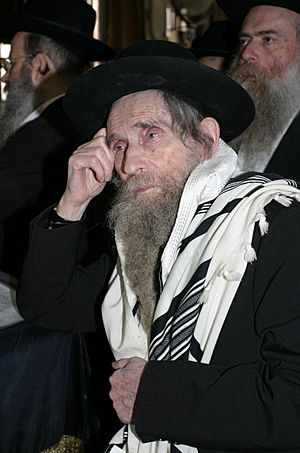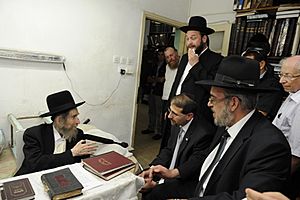Aharon Yehuda Leib Shteinman facts for kids
Quick facts for kids Aharon Yehuda Leib Shteinman |
|
|---|---|
 |
|
| Religion | Judaism |
| Denomination | Haredi Judaism |
| Alma mater | Yeshivas Etz Chaim |
| Personal | |
| Nationality | Israeli |
| Born | Aharon Yehuda Leib Shteinman November 3, 1914 Brest, Imperial Russia |
| Died | December 12, 2017 (aged 103) Mayanei HaYeshua Medical Center, Bnei Brak, Israel |
| Spouse | Tamar Kornfeld |
| Children | Rochel, Moshe, Shraga, Tova |
| Position | Rabbi |
| Position | Rosh yeshiva |
| Yeshiva | Ponevezh Yeshiva L'Tzi'irim |
| Position | Posek |
| Organization | Degel HaTorah |
| Began | 1955 |
| Yahrtzeit | 24 Kislev 5778 |
| Residence | Bnei Brak |
Aharon Yehuda Leib Shteinman (Hebrew: אהרן יהודה לייב שטינמן), also known as Shtainman or Steinman, was a very important Haredi rabbi in Bnei Brak, Israel. He was born on November 3, 1914, and passed away on December 12, 2017. After another great rabbi, Yosef Shalom Elyashiv, died in 2012, Rabbi Shteinman was seen by many as the Gadol HaDor. This means he was considered the main leader of the non-Hasidic (Lithuanian) Haredi Jewish world. He helped bring back and grow the popularity of European-style religious schools, called yeshivas, in Israel.
Contents
Early Life and Challenges
Aharon Yehuda Leib Shteinman was born in Kamyenyets and grew up in Brest, which was then part of the Russian Empire. His parents were Noach Tzvi and Gittel Faiga. He studied at religious schools, called yeshivas, including Yeshivas Toras Chessed in Brest. He also attended special Torah lessons given by famous rabbis like Yitzchok Zev Soloveitchik and Aharon Kotler.
When he was 23, in 1937, he was old enough to be drafted into the Polish army. Brest was then part of Poland. To avoid joining the army, he and a friend tried to make themselves look unfit for service. But the army doctors said they were healthy enough. So, they fled to Montreux, Switzerland, where they continued their religious studies at Yeshivas Etz Chaim.
When World War II started, they became refugees. They were sent to a labor camp where most people were also religious. Rabbi Shteinman was put to work building roads. But because he was thin and short, he was given a desk job instead. Sadly, he was the only person in his family to survive the war.
Rabbi Shteinman was known for living a very simple life. His apartment in Bnei Brak was not fancy. For many years, he slept on the same thin mattress he received when he first arrived in Israel in the 1950s.
Rabbinic Leadership
When Rabbi Shteinman first came to Israel, he lived in Kfar Saba with his family. Later, they moved to Bnei Brak. There, he became the head of the Ponevezh Kollel, which is a place where married men study Torah. In 1955, he was asked to be the dean, or rosh yeshiva, of Ponevezh L'Tzi'irim, a younger yeshiva. He stopped giving regular lessons in 1998 but remained the rosh yeshiva. He also led Yeshivas Gaon Yaakov.
Rabbi Shteinman strongly believed that Jewish young men should dedicate their lives to studying the Torah. He guided many students to continue their religious studies. He taught that it was very important for them to focus on their learning.
Role in Politics
Rabbi Shteinman was a key leader in the Degel HaTorah political party, which represents Haredi Jews. He had a lot of influence in the United Torah Judaism political group. He was also close with the Gerrer Rebbe, another important religious leader.
He often told the politicians from his party that their main goal in the Israeli parliament (the Knesset) was to protect the right of yeshiva students to continue their Torah studies without being forced to join the army. He believed that no student should be drafted.
In March 2014, Rabbi Shteinman helped organize a large protest. This protest was against a proposed law that would have required most Torah students to join the army. He was seen crying and praying for the law to be stopped. Even though the law passed at first, it was later canceled when the government changed.
Travels Around the World
Even when he was in his nineties, Rabbi Shteinman traveled to many Jewish communities outside of Israel. He wanted to encourage and strengthen religious life there.
- In 2005, he visited cities in North America like Brooklyn, Lakewood, and New York City. He met with many American Haredi rabbis.
- In 2006, he went to Los Angeles, where over 5,000 people came to hear him speak. He also visited Montreal. After that, he traveled to South American cities like Mexico City and Buenos Aires.
- In 2007, he visited France and England, speaking to large groups in Manchester and Gateshead.
- In 2010, he visited Jewish communities in Odessa, Berlin, and Gibraltar.
- In 2012, he traveled to Paris to give talks to the French Jewish community.
Personal Life
While he was in Switzerland during World War II, Rabbi Shteinman married Tamar (Tema) Kornfeld. She was also a refugee from Poland. They had four children together. Tamar passed away in 2002.
Later Years and Passing
In December 2016, Rabbi Shteinman was hospitalized with pneumonia. He recovered, but doctors noted his health was declining. In January 2017, at 102 years old, he was hospitalized again for breathing problems and a fever. He was released after two weeks. He was hospitalized once more in October 2017.
Rabbi Shteinman passed away on December 12, 2017, at the age of 103. His funeral was a very large event, with an estimated 200,000 Jewish people attending.
Published Works
Rabbi Shteinman wrote many popular pamphlets, called kuntresim, about Jewish topics like faith (emunah), education (chinuch), and Divine guidance (hashgacha). These pamphlets were based on lessons he gave to students.
He also published his main works on the Talmud (a central text of Jewish law) without using his real name. He used the name Ayelet HaShachar, which means "morning star." This name also included the first letters of his and his wife Tamar's names in Hebrew.
Some of his works include:
- Ayeles HaShachar al HaTorah (on the first five books of the Torah)
- Ayeles HaShachar on Shas (Talmud)
- Chessed Umishpat on Maseches Sanhedrin
- Yimaleh Pi Tehilasecha (ethical talks)
- Mipekudecha Esbonan (talks on the Jewish High Holy Days)
|
See also
 In Spanish: Aharon Yehuda Leib Shteinman para niños
In Spanish: Aharon Yehuda Leib Shteinman para niños


